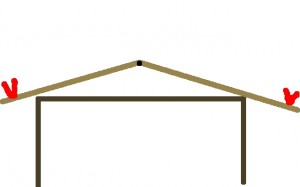Ask for what you want, not what you think will get you there.
Why? Because there are probably solutions to your problem you don’t know exist. I was reminded of this last night when watching Ramit’s webcast on résumé building. At the beginning of the webcast he was getting questions like: what kind of font should I use on my résumé? He was cringing because that has almost nothing to do with what makes a good résumé. There is a note on who Ramit is at the end of this post if you don’t know who he is.
Two Other Examples
Example One, Beer Pong
The example I like to give to college aged kids: My friend John threw a party at my house a couple years back and built a beer pong table which sits on top of a regular table. The table is simply two pieces of plywood and some hinges. While he was setting up for the party I was busy studying for a midterm and he came to me and asked to borrow some books to keep the hinges from bending, like so:

Now, you probably know that college books are EXPENSIVE, averaging over $100 per book. So obviously, I’m not going to let him use my books to hold together a beer pong table. Instead he used radiator fluid and my Craftsman toolbox, which you can see below:

This worked, however it was still a poor fix because a hard jostle on the table would still cause it to bend. If he had told me his actual problem (holding the beer pong table down) I could have solved his problem in 5 seconds: simply use some C clamps (which I have) to hold the beer pong table down. But, that’s not what he asked me, and thus he had to jerry rig his own poor solution.
Example Two: Fitness!
I was looking on Quora.com the other day and saw dozens of questions like these:
- When should I eat protein? Before or after working out? How long after?
- How can I strengthen my abs/core?
- How many bicep curls should I do?
- How many calories should I cut?
These have nothing to do with what they actually want: to look/feel better, live longer, and/or be stronger. Instead of asking for what they want, they’re asking for advice on the things they’ve heard.
Potential Solutions
One solution is to simply attach the problem you’re trying to solve after the question, like so:
- Do you have any heavy books I can use? Because I want to hold my beer pong table together and I think the weights will do that.
- When do you think I should eat my protein? Because I am doing X workout routine and want to get muscles fast.
- What font should I use on my résumé? Because I’m applying for a job and I want to improve my résumé to improve my chances.
This gives the person you are asking a little more information to work with and thus the ability to offer solutions which are unrelated to your question. Another solution would be to start with a statement defining your situation. For example:
I am looking into home defense and was thinking of buying a gun, what kind of gun should I buy?
This question is much more effective than asking something like, what kind of gun should I buy? The answer to this question will be way different depending on if you want a gun to defend your home, shoot skeet, or hunt. Also, now that more information has been provided, the person answering could suggest a security service, an alarm system, or a guard dog.
Any other suggestions? Feel free to post a comment!
If you’re wondering who Ramit is, he is the creator and author of the book and blog “I Will Teach You To Be Rich”. Definitely check out both! How good is it? My brother asked me for advice on what he should do for investing, I sent him an email talking about 10 pages from Ramit’s book and the next day he took action and told me, “I’ve talked with 6 friends IN BANKING and none had anything nearly as good as what you told me.”


